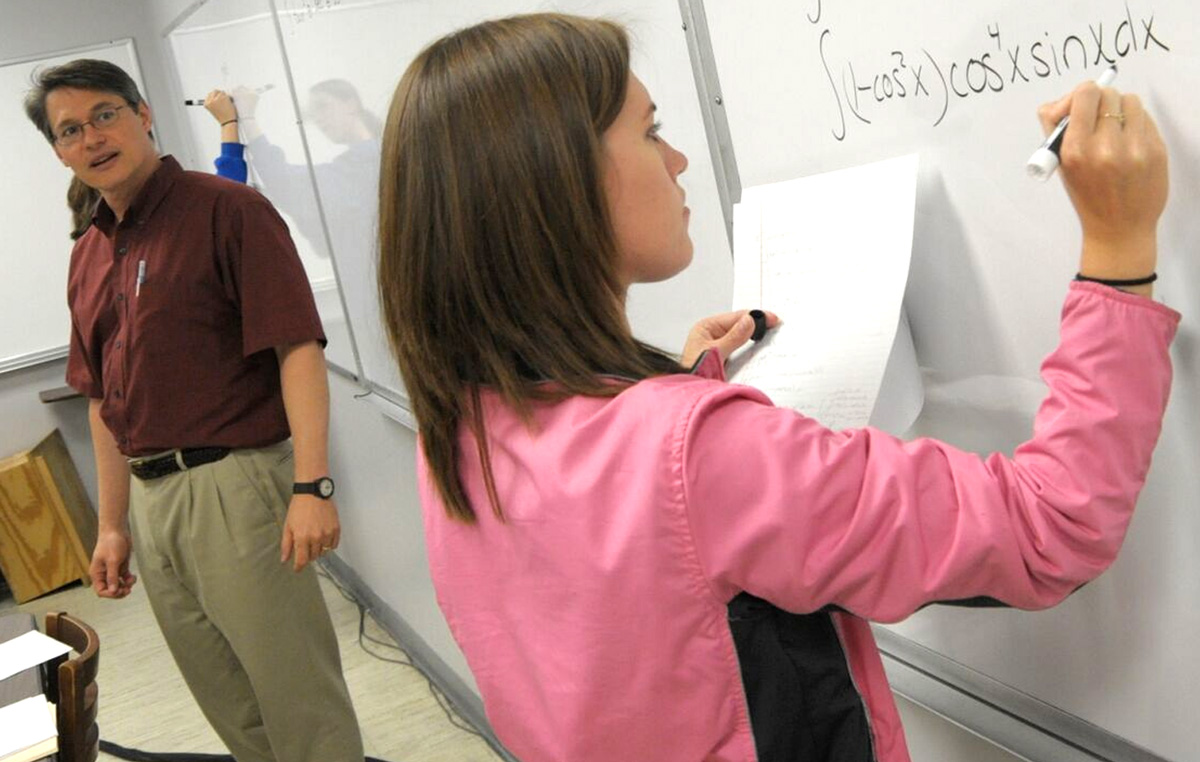Careers in Math
The Department of Mathematics prepares students for life by teaching them to think critically, to solve problems creatively and to effectively organize and communicate information. Our graduates often follow one of four career paths:
- Actuarial Science (insurance, financial)
- Applied Mathematics (business, industry, government)
- Math Education (secondary or collegiate)
- Research & Graduate School (higher education, government)
Actuarial Science
Actuarial Science Advisor: Troy Riggs
Actuaries evaluate the current financial implications of future risks. Traditionally, actuaries calculate premium rates for insurance products and determine the value of associated assets and liabilities. Today, many financial products have features that depend upon fluctuating interest rates, the performance of certain stock indices, and the life/health status of the owner. Also, increasingly business and government are appreciating the importance of stochastic science in managing risks and making projections. For these reasons, actuarial training is in greater demand than ever. Job rating services continue to rank the profession as highly desirable.
Actuarial science at Union is an interdisciplinary program of study in business, mathematics, and statistics. The program is offered as a minor within the mathematics major. The minor includes courses in accounting, economics, finance and computer science.
In the senior year students take a two-semester sequence in which they bring this knowledge together to solve practical problems valuing loans, bonds, insurance and life annuities.
For more information on the profession see Be an Actuary.
Courses for the Minor in Actuarial Science (Math Major)
The following courses are required for any mathematics major who selects the minor in actuarial science:
- ACC 211, Principles of Accounting I (3)
- ACC 212, Principles of Accounting II (3)
- ECO 211, Principles of Macroeconomics (3)
- ECO 212, Principles of Microeconomics (3)
- FIN 320, Business Financial Management I (3)
- ECO 411, Intermediate Macroeconomics OR ECO 412, Intermediate Microeconomics (both 3)
- MAT 400, SOA Course 1 Exam Preparation (1)
- Total - 19
Additionally, MAT 305, MAT 401 and MAT 402 must be used to fulfill the 9 hours of upper level electives within the mathematics major.
See Curriculum Guides for a complete four-year program of courses for a mathematics major with the actuarial minor.
Recent Graduates
- Braden Watkins ('22) is currently working for Blue Cross Blue Shield in Chattanooga, TN as an actuarial assistant.
- Kim Lukens ('13) is currently working in Cincinnati, OH in the Pricing Analytics Department for the Cincinnati Insurance Company.
- Corey Wilson ('14) is currently working in Nashville, TN as a pension actuary for BPSM, an employee benefits consulting firm.
Applied Mathematics
While there are few people with the job title Mathematician, a major in mathematics is excellent preparation for finding jobs in financial areas such as banking or insurance. Others go into industrial settings in areas such as quality control and operations research. There are also opportunities for careers in government, including everything from state-level departments to the National Security Agency.
Many of our students benefit from a double major in mathematics and another discipline such as computer science or physics. For recent graduates this has led to employment with pension consulting, medical imaging and data analysis.
Math Education
For many years there has been a shortage of effective mathematics educators at the secondary level. Those trained from a Christian perspective are even rarer. The Mathematics Department joins with the College of Education in preparing math teachers to live out their faith while helping students develop procedural fluency, conceptual knowledge, and reasoning skills in mathematics. Math majors can become certified to teach at the middle and high school levels by completing education classes including our year-long internship in a local school. Some of our majors have even completed part of their internship at a school overseas.
Research & Graduate School
Just as research in the sciences aims to make new discoveries, mathematical research can also help us expand our knowledge of mathematics. In fact, mathematical discoveries are behind much of the technology we enjoy every day, such as securing transactions over the internet, detecting/correcting errors in digital transmissions in order to preserve the quality of audio and video content, creating realistic animation in movies, and much more. While not all mathematical research is as visible or as easily explained as these examples, the thrill of discovery and the satisfaction of exploring a new idea can make for an enjoyable and rewarding career.
Opportunities to explore research in mathematics usually require an advanced degree, and our department has a good track record of preparing students to thrive in graduate school. We have alumni serving as university professors or working in a research institute or government agency.

